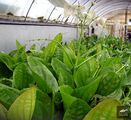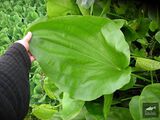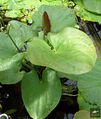Aquarius floribundus (Seub.) Christenh. & Byng

Basionym : Echinodorus floribundus (Seub.) Seub.
Synonyms:
Alisma floribundum Seub.
Alisma pubescens var. claussenii Seub.
Echinodorus grandiflorus subsp. aureus (Fassett) R.R.Haynes & Holm-Niels.
Echinodorus grandiflorus var. aureus Fassett
Echinodorus grandiflorus var. claussenii (Seub.) Hoehne
Echinodorus grandiflorus var. floribundus (Seub.) Micheli
Echinodorus macrophyllus var. muricatus (Griseb.) Micheli
Sagittaria brasiliensis Mart. ex Micheli
Occurrence:
From Mexico and Cuba via Venezuela, Colombia, Peru and Brazil to Bolivia, Paraguay and northern Argentina.
Ecology
Grows in palm swamps (Mauritia flexuosa L. f.), along lake margins and in damp depressions in flooded savannahs. From sea level to 1650 m.
Morphology General habit
Perennial, from horizontal rhizomes, petioles and stems hairy, up to 300 cm
Morphology Leaves
Leaves emersed, blades broadly ovate, star-shaped pubescent on the underside, 11 - 21-veined, 20 - 40 cm long, 16 - 40 cm wide, translucent markings as dots present or rarely absent, apex blunt to obtuse, base heart-shaped, petiole round, star-shaped hairy, up to 90 cm long, 0.5 - 2.5 cm in diameter, base with sheath up to 22 cm long
Morphology Reproductive morphology Fruits
Fruit oblique, 2 - 3 ribbed, glandular, 1.8 - 2.8 mm long, 1 mm wide, glands 2 - 3, separated by ribs, elongated, beak end, erect, 0.2 - 0.3 mm.
Morphology Reproductive morphology Inflorescences
Inflorescence paniculate, of 8 - 16 whorls, each 7 - 18-flowered, erect, protruding leaves, occasionally outgrowing, up to 120 cm long, up to 70 cm wide, rachis round, peduncle round, star-shaped hairy, up to 155 cm long, 2.5 cm diam, bracts lanceolate, coarse, 1 - 4 cm long, 4 - 11 mm wide, 11 - 24 veins, pointed tip, pedicels spread out in flower and fruit, 1 - 4 cm long, 1 mm diam. flowers 3 - 4 cm in diameter, sepals erect, 12 - 19-veined, 7 mm long, 5 mm wide, veins without papillae, petals spreading, white, without claws, overlapping, ca. 20 mm long, 18 mm wide, stamens 24 - 30, anthers many-sided, ca. 1.5 mm long, filaments c. 3 mm long, carpels numerous
Phenology
Flowering and fruiting all year round.[1]
-
Echinodorus floribundus (Seub.) Seub.[2]
-
Echinodorus floribundus (Seub.) Seub.[2]
-
Echinodorus floribundus (Seub.) Seub.[2]
-
Echinodorus floribundus (Seub.) Seub.[3]
-
Echinodorus floribundus (Seub.) Seub.[3]
-
Echinodorus floribundus (Seub.) Seub.[3]
-
Echinodorus floribundus (Seub.) Seub.[3]
-
Echinodorus floribundus (Seub.) Seub.[3]
-
Echinodorus floribundus (Seub.) Seub.[3]
-
Echinodorus floribundus (Seub.) Seub.[3]
-
Echinodorus floribundus (Seub.) Seub.[3]
- ↑ POWO (2021). Plants of the World Online. Facilitated by the Royal Botanic Gardens, Kew. Im Internet veröffentlicht; www.plantsoftheworldonline.org/ Abgerufen am 22. August 2021.
- ↑ 2.0 2.1 2.2 Kostiantyn Loboda, Black Water http://echinodorus.com.ua/
- ↑ 3.0 3.1 3.2 3.3 3.4 3.5 3.6 3.7 Echinodorus floribundus (Seub.) Seub.by Alex Popovkin, Bahia, Brazil is licensed under CC BY-NC 2.0











